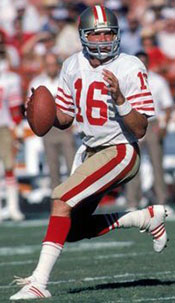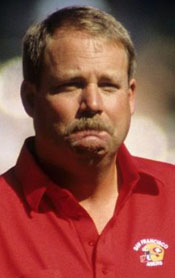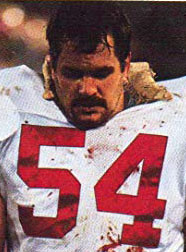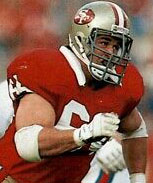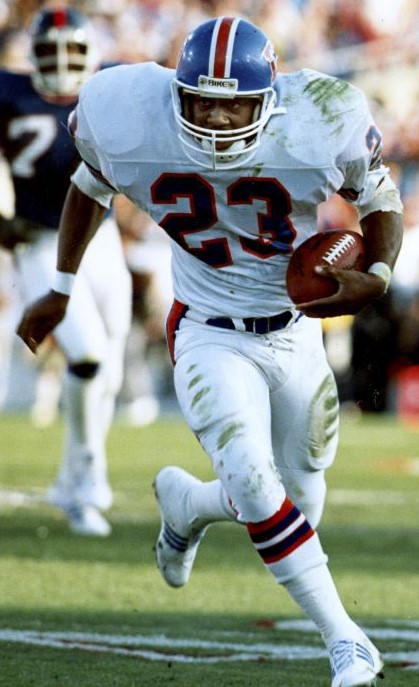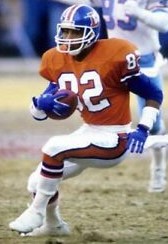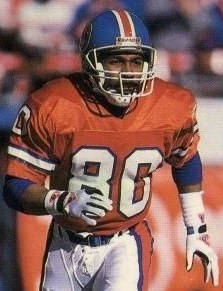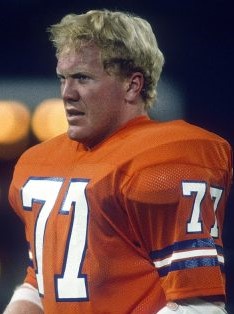|
Super Bowl XXIV - San Francisco 49ers vs Denver Broncos: Pregame
San Francisco coach Bill Walsh announced after Super Bowl XXIII that he wasn't returning as coach. The players were happy when Defensive Coordinator George Seifert became the new head man to maintain continuity.
- George had been defensive backs coach, then defensive coordinator since joining the staff in 1980.
- "It wasn't like George was a new personality that we had to get comfortable with," said G Guy McIntyre. "George had been around ever since I had been around. He wasn't like somebody off the street."
- Jerry Rice recalled: "Our new head coach ... preferred to be behind the scenes and let the players take the front stage."
- Near the end of his first season as head coach, Seifert said, "We really didn't enter this season with the idea that we were going to change a heckuva lot. We had a very set and sound offense, and we felt our defense was established. Bill had established something very solid here. All we really sought to do this year was maintain what he had."
The veteran 49ers, with 20 of 22 starters returning from the 1988 Super Bowl champions, didn't miss a beat in 1989.
- They lost only two games by a total of five points to finish 14-2, the NFL's best record, and earn the #1 seed in the NFC playoffs.
- They steamrolled the Minnesota Vikings 41-13 and the Los Angeles Rams 30-3 in the playoffs to stake a claim as one of the strongest teams in NFL history. The Ram victory got revenge for one of the two regular-season defeats.
Mention the name "1989 49ers" and "Joe Montana" immediately comes to mind.
- Montana was the highest-rated quarterback of all time for one season, the playoffs, and Super Bowls.
- In the two playoff games, he completed nearly 80% of his passes.
- In his three Super Bowl appearances, he had completed 66% of his passes for 845y, six touchdowns, and no interceptions.
- At age 33, Montana, playing through injuries to his elbow, knee, and ribs, led the 1989 49ers' offense of new coordinator Mike Holmgren to the #1 position in the league.
- He didn't do it alone, of course. He had an outstanding receiving corps of Jerry Rice, John Taylor, Roger Craig, and Tom Rathman and an offensive line that gave up zero sacks to the Vikings and Rams, two strong defensive teams.
The San Francisco defense was no slouch either.
- Led by S Ronnie Lott, they ranked second in the NFC and fourth in the NFL.
- The defense was made even better in the offseason with the addition of LB Matt Millen, a veteran of nine years with the Raiders, and NT Jim Burt from the New York Giants.
- The 49ers outscored their regular season opponents 442-253.
Within their locker room, the 49ers had an extra reason for wanting to win Super Bowl XXIV.
- They wanted to prove to the world that "genius" Walsh was only one of the reasons for the team's earlier success.
- Rice: "We were determined to show that the system that we had developed was what made the franchise great, and we were strongly motivated to make our own statement by repeating as Super Bowl champions under a rookie head coach."
- Millen joined the 49ers two days before the first regular season game. "As soon as I got there, I realized the team was on a mission. Guys were loyal to Walsh but wanted to prove, maybe just to themselves, that they had a bigger role in the success of the 49ers than they had been credited with. ... It was a very prevalent opinion that, 'Hey, we'll win it this year because of us.'" Matt added, "George Seifert stayed with the defense for the majority of the team, and Mike Holmgren coached the offense. George had a quiet manner, and the first thing I noticed about him is that he let his players play. ... I'd say that maintaining the status quo was a big part of his approach. He didn't rock the boat."
The San Francisco defense was no slouch either.
- Led by S Ronnie Lott, they ranked second in the NFC and fourth in the NFL.
- The defense was made even better in the offseason with the addition of LB Matt Millen, a veteran of nine years with the Raiders, and NT Jim Burt from the New York Giants.
- The 49ers outscored their regular season opponents 442-253.
The Denver Broncos won the American Conference championship for the third time in four years.
- They finished 11-5 to claim the #1 seed and the home field advantage throughout the AFC playoffs.
- After enjoying a bye week, they edged the Pittsburgh Steelers 24-23.
- They beat the Cleveland Browns in the title game 37-21.
The Broncos finished fourth in the AFC in points scored but first in points allowed.
- QB John Elway, in his seventh year in the league, finished 17th in the NFL in Passer Rating (73.7 compared to #1 Montana's 112.4).
- Bobby Humphrey was far and away the team's leading rusher with 1151y. FB Sammy Winder was second with just 351.
- WR Vance Johnson led the receivers with 76 catches for 1,095y. Mark Jackson was a distant second with 28 catches for 446y.
Denver's strength was on the defensive side of the ball.
- Karl Mecklenburg, the left inside linebacker in the 3-4 alignment, led the team with 143 tackles.
- Joining Mecklenburg as Pro Bowl selections were SS Dennis Smith and NT Greg Kragen.
The Broncos had lost their three previous Super Bowl appearances,
- The margin of defeat increased each time, ending with a 42-10 trouncing by the Washington Redskins in Super Bowl XXII.
- The 49ers started Super Bowl week as a 12-point favorite–the highest for a Super Bowl since XIV–and the line stayed there all week.
Ninth-year Denver head coach Dan Reeves decided to change his preparation agenda for the big game.
- Vance Johnson recalled, "We had never gone to the Super Bowl and practiced in pads. Dan Reeves made us wear pads. He made us run. He also made us do a lot of hitting, and we never hit before a Super Bowl."
- The 49ers noticed the change and figured it would serve as another advantage for them. RB Roger Craig said, "I can remember they were doing two-a-day practices. If you're not in shape by now, doing two-a-days is only going to wear you done late in the season."
- Reeves clearly wanted to set a more physical tone for the game. But that played right into the hands of the 49ers. Craig: "We love when you play physical with us. That's when we're at our best. People didn't figure it out. When you run the West Coast offense as efficient as the way we did, that's when we were at our best."
Elway also made a personal change to try to change his luck. He arrived in New Orleans with his blond hair lapping over the collar of his shirt. For his previous Super Bowls, he had his hair trimmed and styled, only to go out a well-groomed loser.
The entire Denver team brought a new No more Mr. Nice Guy attitude to New Orleans. On their first night in the Crescent City, a group of Broncos blew off several 49ers who offered to buy them drinks in the French Quarter. "They didn't want anything to do with us," recalled SF RB Spencer Tillman. "I was kind of surprised. I mean, we can at least be cordinal to each other."
Montana added, "To be honest, I think it ticked some of our guys off. It probably was a good thing for us. It set a tone for the week."
Reeves couldn't understand why his Broncos were such big underdogs.
- The Denver coach was buoyed by the fact that he had beaten the 49ers in close games in 1982 (24-21), 1985 (17-16), and 1988 (16-13 in overtime).
- "I had not lost a regular-season game to San Francisco," he recalled. "I was kind of surprised when they came out such a heavy favorite. I thought it was going to be a great football game ..."
What Reeves didn't realize was that he made a change on his coaching staff after the 1988 season that would backfire on him in the Super Bowl. Joe Collier was the architect of the defense for the first three Denver teams that made the Super Bowl. Collier had been effective against the 49ers because he played mostly zone defense and usually rushed only three defenders. That scheme forced Montana to throw either safe passes underneath or deep, low-percentage passes. Also, Collier would rotate his defensive linemen to keep them fresh.
The problem between Reeves and Collier started after Super Bowl XXII when the Redskins embarrassed the Broncos 42-10. Reeves wanted Collier to change some of his defensive staff. Collier refused, and Reeves backed down. But after the Broncos went 8-8 in 1988, with the defense giving up a lot of points the second half of the season, Reeves replaced Collier with Wade Phillips.
Phillips deployed almost exactly the opposite scheme from Collier. Phillips' wanted players who were bigger and more physical than previous Bronco defenders. His attacking, blitz-heavy, four-man front defense moved the Broncos from ninth in the AFC in points allowed in '88 all the way up to first in '89. Denver also forced 43 turnovers, top in the AFC.
The problem was that the 49ers' West Coast offense ate up teams using Phillips' scheme. The default throw in the West Coast offense against the coverages that Phillips tended to call, especially when the defense blitzed, was the post pattern. Elway knew that because he had played in the West Coast offense in college.
In practice before the Super Bowl,
Elway and his backup, Ted Kubiak, ran the scout team against Phillips' defense and repeatedly hit the post route for big gains.
"We kept trying to tell them this is what the 49ers would do if we showed them that defense," Elway recalled. But Phillips' staff didn't listen. Instead, defensive backs coach Charlie Waters told Elway and Kubiak to stop throwing the post route because the 49ers never used it. Elway disagreed in vain.
- In his eighth Super Bowl as a player and coach, mostly as a loser, Reeves told the press, "I do believe in the law of averages. And hopefully, if I'm here long enough, the law of averages will catch up, and I'll win."
- But he added, "We realize the task in front of us. We're reminded of it every day by the press who tell us we don't have a chance."
Early in his pro career, John Elway set a major goal for himself.
- "My goal is to beat Terry Bradshaw. He won the Super Bowl four times. I want to win it five." But in January 1990, Elway was 0-and-2 in Super Bowls.
- "We know how to get here," he told the assemblage of reporters. "But we got to figure out how to win one."
- He added, "Any time your team's been to the Super Bowl three times and lost, and this is your fourth time, there's a little bit of a monkey. You win, and you lose that monkey. You can be 1-and-8, and you don't have that monkey on your back like 0-and-4."
- "For me to be the quarterback I want to be, we've got to win this game. If we win it'll be the greatest upset of all time."
- Asked by a reporter if he wanted to guarantee victory like Joe Namath at Super Bowl III, John replied, "Get us another point and a half, and I'll guarantee it." After a pause, he added, "I guarantee we'll cover the spread."
Bradshaw, an analyst for CBS, sparked a controversy when he was asked his opinion of Elway.
- "I think John's problem is he's been babied by the fans, the media, and, to an extent, by the coaches. It's really too easy for him."
- "He's too inconsistent. He lets too many things bother him. He's got to get a little tougher emotionally. Things like that shouldn't bother you when you're making two million dollars a year."
- "Is he a great quarterback? Nope. A good one. When you choose a profession, if you don't reach a pinnacle, you can't consider yourself a success."
- Asked his response to Bradshaw's comments, Elway said, "Terry Bradshaw has been bashing me since I got in the league. He didn't like the money I make. He still doesn't. He can stick it in his ear."
- Dan Reeves responded this way. "I played against Terry Bradshaw, and John Elway is as tough as Terry Bradshaw ever was. Terry Bradshaw had a hell of a supporting case, and he better be thankful for that."
The coaches and players all said the right things as gameday approached.
- Seifert: "To win the Super Bowl, we have to play our best game. This is the best opponent we've played by far. I would say Elway is in sync. I would say our offense is in sync. I think the pressure is going to be on the defenses."
Matt Millen: "I'd always hear about how a team was really good and how they could do this this, and this. Then we got the tapes of the Broncos, who supposedly could do all that, and after we watched them, we said, 'Well, they can't run the football well and they don't run good pass routes ... but, well, they've got John Elway.' That's all you said. And you say 'Hold on. They've got only one guy? He's got to do it all by himself? Offense and defense?' ... We decided that the main we had to do was to keep John Elway from making big plays. We didn't feel they could methodically work the ball down the field an score by running the football."
- Reeves: "Our defense is facing a team with a lot of weapons. We've got to help them by moving the ball offensively and taking some of the time-of-possession away from the 49ers."
- Denver defensive coordinator Wade Phillips said Montana typically has a three-receiver progression he goes through quickly in seeking the open man. "If the first guy isn't there, and the second guy isn't there, he hits the third guy–just boom, boom, boom. He's seen all the blitzes. Even if you blitz clean, he gets the ball off and makes the completion. But you can get pressure on any quarterback–even the great ones–and that makes it tougher for them to have a good game."
- Broncos CB Wymon Henderson: "You look at film, and you come away amazed. Their receivers are so dangerous after the catch. They'll make a 5y catch and turn it into a 50y gain. They seem to be tackled, but they get away. We've got to keep them in front of us and make the tackles."
The 49ers front office brought along a box of clippings from Super Bowl III predicting the Baltimore Colts would beat the New York Jets handily. They kept them handy in case the players showed signs of taking the Broncos too lightly. But they didn't. Practices were crisp, and Montana was sharp. When four players missed curfew one night, they were called to task at a team meeting the next day led by Ronnie Lott.
The Broncos had not had good experiences playing in the Superdome.
- They lost the Super Bowl to the Dallas Cowboys in 1978 and were blown out 42-0 by the Saints during the 1988 season.
- The 49ers weren't likely to be distracted by what Denver owner Pat Bowlen called the "adult experience" of New Orleans. They played an NFC West game there every season, so they knew the city and what can happen to a visitor who spends too much time in the French Quarter.
The 49ers locker room before the game was relatively quiet.
- There were no pep talks. What little conversation that took place was players reviewing their responsibilities.
- Millen: "We were loose. We were confident we were going to win."
For unknown reasons, the TVs in the Broncos' locker room were tuned to the CBS pregame show.
The owner of the 49ers, Eddie DeBartolo Jr., got ready to watch the game in his site with his former coach.
- "I'll never forget sitting in my box with Bill Walsh before the game started. I said, "Boy, Bill, this is going to be a tough game.'"
- "He said, 'I don't think so.'"
Right before the game, 49ers LB Matt Millen asked Montana, who had been on target all week: "Joe, how many points are we going to get?"
"A hundred, if they'll let me," Joe replied. He added, "If they play their safeties the way they've been playing them, we'll eat 'em alive."
Studying film of the Broncos, 49ers Offensive Coordinator Holmgren saw two- and three-deep zone coverages with the two safeties extremely outside consicious. "That's the defense that Bill Walsh designed his whole offensive scheme for when he first came to San Francisco, the static base 3-4. I remember Bill saying one day, 'Doesn't anybody play the old-style 3-4 anymore? Well, these guys do."
It was CBS's turn to televise the Super Bowl.
- Pat Summerall did the play by play with John Madden as his analyst.
- Once again, Jack Buck and Hank Stram handled the CBS radio broadcast, this time with former 49er Randy Cross as the third member of the crew.
- New Orleans-own Aaron Neville sang the National Anthem.
- The NFL legends participating in coin toss were Mel Blount, Terry Bradshaw, Art Shell, and Willie Wood.
|
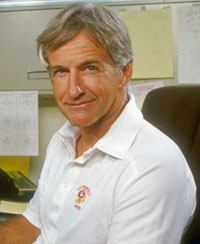
George Seifert
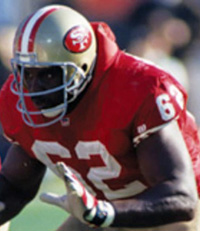
Guy McIntyre
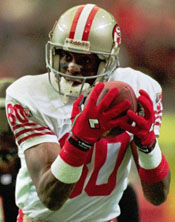
Jerry Rice
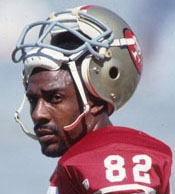
John Taylor
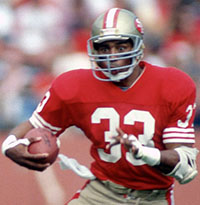
Roger Craig
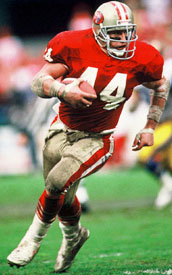
Tom Rathman
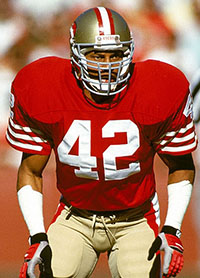
Ronnie Lott
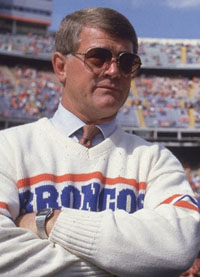
Dan Reeves
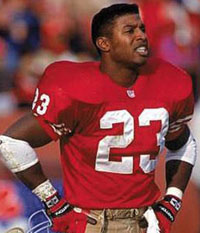
Spencer Tillman
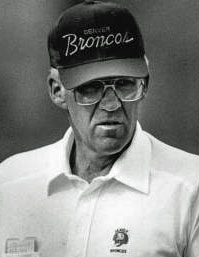
Joe Collier

John Elway
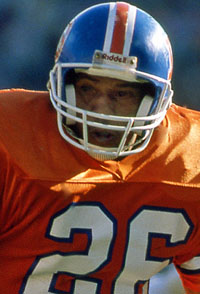
Bobby Humphrey
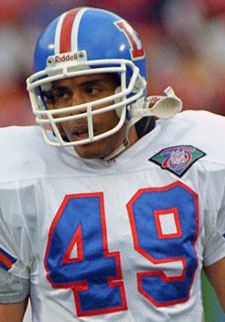
Dennis Smith
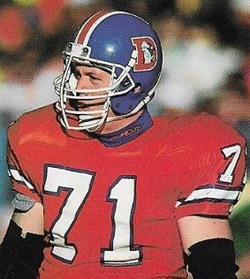
Greg Kragen
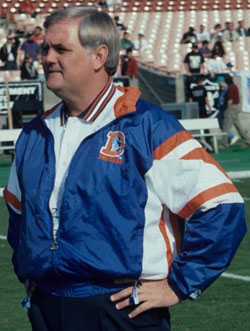
Wade Phillips
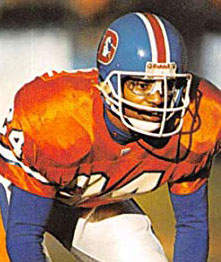
Wymon Henderson
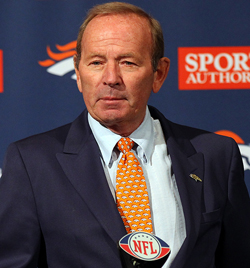
Pat Bowlen
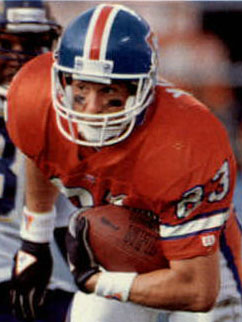
Michael Young
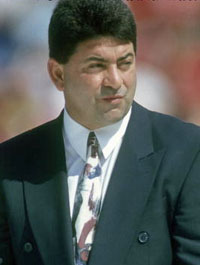
Eddie DeBartolo Jr.
|
1989 San Francisco 49ers
| # |
Player |
Pos. |
Hgt. |
Wgt. |
College |
Exp. |
| 6 |
Mike Cofer |
K |
6-1 |
190 |
North Carolina State |
2 |
| 8 |
Steve Young |
QB |
6-2 |
200 |
Brigham Young |
5 |
| 9 |
Barry Helton |
P |
6-3 |
205 |
Colorado |
2 |
| 16 |
Joe Montana |
QB |
6-2 |
195 |
Notre Dame |
11 |
| 21 |
Eric Wright |
CB |
6-1 |
185 |
Missouri |
8 |
| 22 |
Tim McKyer |
CB |
6-0 |
175 |
Texas-Arlington |
4 |
| 23 |
Spencer Tillman |
RB |
5-11 |
205 |
Oklahoma |
3 |
| 24 |
Harry Sydney |
FB |
6-0 |
215 |
Kansas |
3 |
| 26 |
Darryl Pollard |
CB |
5-11 |
185 |
Weber State |
3 |
| 29 |
Don Griffin |
CB |
6-0 |
175 |
Middle Tennessee St |
4 |
| 30 |
Keith Henderson |
RB |
6-1 |
220 |
Georgia |
1 |
| 31 |
Chet Brooks |
S |
5-11 |
190 |
Texas A&M |
2 |
| 32 |
Terrence Flagler |
RB |
6-0 |
200 |
Clemson |
3 |
| 33 |
Roger Craig |
RB |
6-0 |
215 |
Nebraska |
7 |
| 40 |
Johnny Jackson |
S |
6-1 |
205 |
Houston |
1 |
| 42 |
Ronnie Lott |
CB |
6-0 |
200 |
USC |
9 |
| 44 |
Tom Rathman |
RB |
6-1 |
230 |
Nebraska |
4 |
| 53 |
Bill Romanowski |
LB |
6-4 |
230 |
Boston College |
2 |
| 54 |
Matt Millen |
LB |
6-2 |
245 |
Penn State |
10 |
| 56 |
Steve Hendrickson |
LB |
6-0 |
245 |
California |
1 |
| 58 |
Keena Turner |
LB |
6-2 |
220 |
Purdue |
10 |
| 59 |
Keith DeLong |
LB |
6-2 |
235 |
Tennessee |
1 |
| 60 |
Chuck Thomas |
C-G |
6-3 |
280 |
Oklahoma |
4 |
| 61 |
Jesse Sapolu |
G |
6-4 |
260 |
Hawaii |
4 |
| 62 |
Guy McIntyre |
G |
6-3 |
265 |
Georgia |
6 |
| 64 |
Jim Burt |
NT |
6-1 |
260 |
Miami |
9 |
| 66 |
Terry Tausch |
G |
6-5 |
275 |
Texas |
8 |
| 67 |
Pete Kugler |
NT |
6-4 |
255 |
Penn State |
7 |
| 69 |
Bruce Collie |
G |
6-6 |
275 |
Texas-Arlington |
5 |
| 74 |
Steve Wallace |
T |
6-4 |
275 |
Auburn |
4 |
| 75 |
Kevin Fagan |
DE |
6-3 |
265 |
Miami (FL) |
3 |
| 77 |
Bubba Paris |
T |
6-6 |
300 |
Michigan |
7 |
| 78 |
Pierce Holt |
DE |
6-4 |
280 |
Angelo State (TX) |
2 |
| 79 |
Harris Barton |
T |
6-4 |
280 |
North Carolina |
3 |
| 80 |
Jerry Rice |
WR |
6-2 |
200 |
Mississippi Valley State |
5 |
| 81 |
Jamie Williams |
TE |
6-4 |
245 |
Nebraska |
7 |
| 82 |
John Taylor |
WR |
6-1 |
185 |
Delaware State |
3 |
| 84 |
Brent Jones |
TE |
6-4 |
230 |
Santa Clara |
3 |
| 85 |
Mike Wilson |
WR |
6-3 |
215 |
Washington State |
9 |
| 88 |
Mike Sherrard |
WR |
6-2 |
185 |
UCLA |
2 |
| 89 |
Wesley Walls |
TE |
6-5 |
245 |
Mississippi |
1 |
| 91 |
Larry Roberts |
DE |
6-3 |
275 |
Alabama |
4 |
| 94 |
Charles Haley |
LB/DE |
6-5 |
230 |
James Madison |
4 |
| 95 |
Michael Carter |
NT |
6-2 |
285 |
SMU |
6 |
| 96 |
Daniel Stubbs |
DE |
6-4 |
260 |
Miami (FL) |
2 |
| 98 |
Antonio Goss |
LB |
6-4 |
230 |
North Carolina |
1 |
| 99 |
Michael Walter |
LB |
6-3 |
240 |
Oregon |
7 |
|
1989 Denver Broncos
| # |
Player |
Pos. |
Hgt. |
Wgt. |
College |
Exp. |
| 2 |
Mike Horan |
P |
5-11 |
190 |
Long Beach State |
5 |
| 7 |
John Elway |
QB |
6-3 |
215 |
Stanford |
7 |
| 8 |
Gary Kubiak |
QB |
6-0 |
190 |
Texas A&M |
7 |
| 9 |
David Treadwell |
K |
6-1 |
175 |
Clemson |
1 |
| 23 |
Sammy Winder |
RB |
5-11 |
205 |
Southern Mississippi |
8 |
| 24 |
Wymon Henderson |
CB |
5-10 |
185 |
UNLV |
3 |
| 25 |
Kip Corrington |
S |
6-0 |
175 |
Texas A&M |
1 |
| 26 |
Bobby Humphrey |
RB |
6-1 |
200 |
Alabama |
1 |
| 27 |
Steve Atwater |
S |
6-3 |
215 |
Arkansas |
1 |
| 29 |
Darren Carrington |
CB |
6-1 |
190 |
Northern Arizona |
1 |
| 30 |
Steve Sewell |
WR |
6-3 |
210 |
Oklahoma |
5 |
| 32 |
Melvin Braxton |
RB |
6-1 |
225 |
Miami |
1 |
| 34 |
Tyron Braxton |
CB |
5-11 |
185 |
North Dakota State |
3 |
| 35 |
Ken Bell |
RB |
5-10 |
190 |
Boston College |
4 |
| 36 |
Mark Haynes |
CB |
5-11 |
195 |
Colorado |
10 |
| 40 |
Jeff Alexander |
RB |
6-0 |
230 |
Southern |
1 |
| 48 |
Randy Robbins |
S |
6-2 |
190 |
Arizona |
6 |
| 49 |
Dennis Smith |
S |
6-3 |
200 |
USC |
9 |
| 51 |
Marc Munford |
LB |
6-2 |
230 |
Nebraska |
3 |
| 54 |
Keith Bishop |
C-G |
6-3 |
290 |
Baylor |
9 |
| 55 |
Rick Dennison |
LB |
6-3 |
220 |
Colorado State |
8 |
| 56 |
Michael Brooks |
LB |
6-1 |
235 |
LSU |
3 |
| 57 |
Mike Ruether |
C |
6-4 |
275 |
Texas |
4 |
| 58 |
Scott Curtis |
LB |
6-1 |
230 |
New Hampshire |
2 |
| 59 |
Tim Lucas |
LB |
6-3 |
230 |
California |
3 |
| 60 |
Gerald Perry |
T |
6-6 |
305 |
Southern |
2 |
| 61 |
Andre Townsend |
DL |
6-3 |
265 |
Mississippi |
6 |
| 65 |
Monte Smith |
G |
6-5 |
270 |
North Dakota |
1 |
| 66 |
Jim Juriga |
G |
6-6 |
275 |
Illinois |
2 |
| 67 |
Doug Widell |
G |
6-4 |
285 |
Boston College |
1 |
| 68 |
Brad Henke |
DL |
6-3 |
275 |
Arizona |
1 |
| 71 |
Greg Kragen |
NT |
6-3 |
265 |
Utah State |
5 |
| 72 |
Keith Kartz |
C |
6-4 |
270 |
California |
3 |
| 73 |
Simon Fletcher |
LB |
6-6 |
240 |
Houston |
5 |
| 76 |
Ken Lanier |
T |
6-3 |
290 |
Florida State |
9 |
| 77 |
Karl Mecklenburg |
LB |
6-3 |
240 |
Minnesota |
7 |
| 80 |
Mark Jackson |
WR |
5-10 |
180 |
Purdue |
4 |
| 82 |
Vance Johnson |
WR |
5-11 |
185 |
Arizona |
5 |
| 83 |
Michael Young |
WR |
6-1 |
185 |
UCLA |
5 |
| 84 |
Ricky Nattiel |
WR |
5-9 |
180 |
Florida |
3 |
| 87 |
Pat Kelly |
TE |
6-6 |
250 |
Syracuse |
2 |
| 88 |
Clarence Kay |
TE |
6-2 |
235 |
Georgia |
6 |
| 89 |
Orson Mobley |
TE |
6-5 |
260 |
Salem |
4 |
| 90 |
Ron Holmes |
DE |
6-4 |
265 |
Washington |
5 |
| 91 |
Warren Powers |
DE |
6-6 |
285 |
Maryland |
1 |
| 92 |
Alphonso Carreker |
DE |
6-6 |
270 |
Florida State |
6 |
| 97 |
Bruce Klostermann |
LB |
6-4 |
230 |
South Dakota State |
3 |
|
References: Super Bowl XXIV Game Program (1989)
The Super Bowl: Celebrating a Quarter-Century of America's Greatest Game (1990)
Super Bowl Chronicles: A Sportswriter Reflects on the First 30 Years of America's Game, Jerry Green (1995)
Super Bowl: The Game of Their Lives, Danny Peary (ed.) (1997)
The Ultimate Super Bowl Book, Bob McGinn (2009)
Best of Rivals: Joe Montana, Steve Young, and the INSIDE STORY behind the NFL's Greatest Quarterback Controversy,
Adam Lazarus (2012)
Tales from the San Francisco 49ers Sideline: A Collection of the Greatest 49ers Stories Ever Told, Roger Craig with Matt Maiocco and Daniel Brown (2012)
50 Years, 50 Moments: The Most Unforgettable Plays in Super Bowl History, Jerry Rice and Randy O. Williams (2015)
Super Bowl Gold: 50 Years of the Big Game, Sports Illustrated (2015)
The Super Bowl: The First Fifty Years of America's Greatest Game, David Fischer (2015)
Montana: The Biography of Football's Joe Cool, Keith Dunnavant (2015)
The First 50 Super Bowls: How Football's Championships Were Won, Ed Benkin (2018)
Elway: A Relentless Life, Jason Cole (2020)
|
|
|
